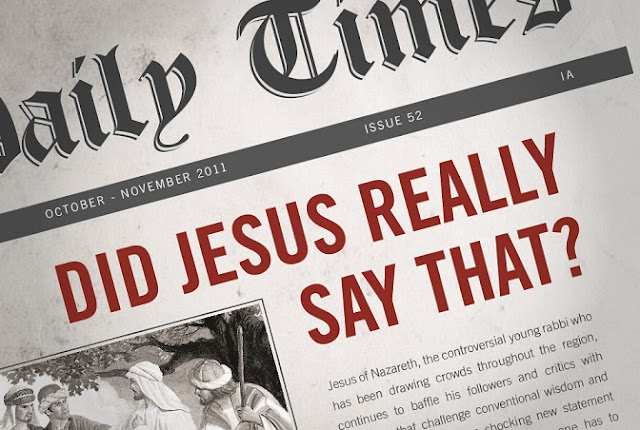 |
| The Man They Crucified: A Portrait of Jesus (1975) by R. T. France |
Philip went to look for Nathaniel and told him, “We have found the very person Moses and the prophets wrote about! His name is Jesus, the son of Joseph from Nazareth.” “Nazareth!” exclaimed Nathaniel. “Can anything good come from Nazareth?” “Come and see for yourself,” Philip replied. As they approached, Jesus said, “Now here is a genuine son of Israel - a man of complete integrity.” “How do you know about me?” Nathaniel asked. Jesus replied, “I could see you under the fig tree before Philip found you.” Then Nathaniel exclaimed, “Rabbi, you are the Son of God - the King of Israel!” (read John 1:45-49). After Nathaniel's personal encounter with Jesus, he turned from being a skeptic to one of His most devoted followers.
Two things will always happen when someone meets the real Jesus of the Bible: accept Him or reject Him. Of course, one can be undecided but not for long because decisions have to be made soon or later when it comes to the person and identity of Jesus (to ignore Him is to reject Him). He demands a verdict! As R. T. France (1938 - 2012), a renowned New Testament scholar, writes about the change that happened to Nathaniel: “That is the sort of thing that happens when Jesus is around. People find their prejudices shaken. Some of them respond by digging themselves deeper into the trenches. Others find themselves, to their amazement, abandoning the preconceptions of a lifetime, and they are never the same again.” By faith, I know why Jesus is irresistible: He is the divine Son of God, the gracious Son of Man, and the wonderful Savior of the world. But these truths, although can be supported by the Scripture, can only be accepted fully by faith. So, what about Jesus in His humanity, in the context of history, that is also irresistible? Or to put it another way, why Jesus was controversial and phenomenal in His lifetime on earth? And why does Jesus still do so today, more than 2,000 years later? This book can help us to understand - as an introduction, not comprehensive studies - Jesus in His historical context and background.
By using the Gospels as France’s main sources for his portrait of Jesus (see Appendix for explanation) and some other reliable materials, he divided the book into 12 chapters, namely, Nazareth, Expectation, Preparation, Disciples, Miracles, Society, Controversy, The Kingdom, Confrontation, Condemnation, Vindication, and Dilemma. The book helps us to explore the life of Jesus as a Jew living in Israel; surrounded by particular religious issues, customs, and ideologies; with unique socioeconomic orders and political turmoils. Examining Jesus’ claims about Himself in these chapters also makes it more meaningful and relevant. These are the things that we must take into considerations when we read the Gospel accounts of Jesus and it helps us to make the decision (that I write earlier) with intellect and awareness NOT just by faith. Well, of course, at the end of the day faith is required to bridge the gap between mere knowledge to saving knowledge. “It would be much more convenient if Jesus could be made to fit the formulas which we are all so good at devising for him, as the ethical reformer, the pacifist, the prophet of the oppressed classes, or whatever. All of these he is, and much more,” said R. T. France in the closing of this highly commended and accessible book, “But he cannot be reduced to any one of them. The only meaningful way to relate to the Jesus of the Gospels is in the totality of the claims he makes on us. If we do not come to him on his terms, we do not come to him at all.”
“Can anything good come from the life of Jesus of Nazareth?” you might ask. I want to invite you to read the Gospel accounts for the first time - or once again - and say, “Come and see for yourself.” And if you need help, this book can be one of your guides 😉☑💡#ServeToLead #LeadersAreReaders #GrowingLeaders #LifeOfJesus #LetsMakeReadingCoolAgain
I also recommend:
1) The
Jesus of the Bible (2009) by Stephen M. Miller ✔
2) Jesus,
A Virtual History (2014) by Donald Brake ✔
3) Jesus
the Messiah: A Survey of the Life of Christ (1996) by Robert H. Stein ✔
To read my other #1Book1Week book reviews, CLICK HERE
FB Page: https://facebook.com/LEGASI.tv/
Podcast:
http://bit.ly/LegasiSpotify
YouTube:
https://www.youtube.com/c/LEGASItv/
THINK BIG. START SMALL. GO DEEP.





























